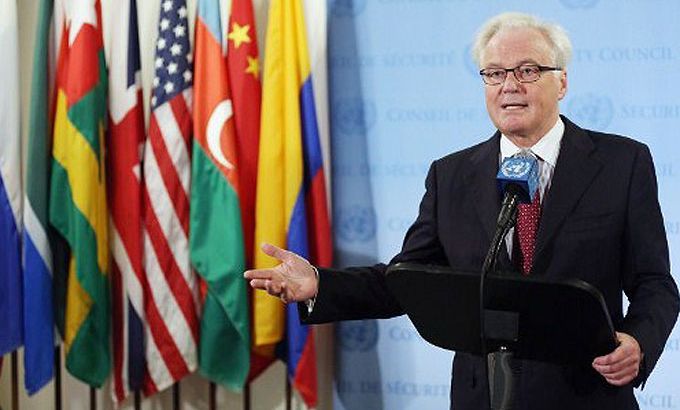Russia, China blast UN resolution on Syria
Russian ambassador to UN says new non-binding resolution is giving ‘blatant’ support to Syrian rebels.

Russia has criticised a UN General Assembly resolution on Syria, calling it “blatant” support for rebel groups battling President Bashar al-Assad.
Vitaly Churkin, Russia’s UN ambassador, said on Friday that the main backers of the resolution, overwhelmingly passed by the UN assembly, were providing “mercenaries and arms” to the Syrian opposition.
He said the resolution, which condemned Assad’s government and the UN Security Council’s failure to act on the Syrian crisis, would not halt the civil war.
“Behind the facade of humanitarian rhetoric, the resolution hides a blatant support for the armed opposition,” Churkin told the assembly.
Without naming them, he said the “most active” backers of the resolution “are actively supporting and financing” the opposition and “giving them mercenaries and arms”. Saudi Arabia drew up the resolution with strong support from other Arab and western nations.
Russia and China have three times vetoed UN Security Council resolutions which could have led to sanctions against Syria, and Churkin also criticised the attack on the Security Council’s failure to act in Friday’s resolution.
He said the resolution “contradicts” efforts to implement the peace plan of Kofi Annan, who resigned on Thursday as the UN-Arab League envoy on Syria. “It undermines the chances for launching a Syrian process for a political settlement,” the Russian ambassador added.
China also voted against the General Assembly resolution. Wang Min, the country’s deputy ambassador, said “a position of pressure on only one party will not help resolve the Syrian issue.
“On the contrary it will derail the political settlement of the crisis, cause further escalation of the turmoil and let the crisis spill over to other countries in the region,” Wang told the assembly, reaffirming China’s condemnation of any military intervention in the crisis.
China also hit back at criticism of its stance over the crisis in Syria, repeating Beijing’s position that outside interference will not help.
Speaking at a news conference in Beijing, Wang Kejian, deputy head of the Chinese Foreign Ministry’s West Asian and North African Affairs Department, said China continued to support efforts at a peaceful, political solution for Syria.
“We should not easily close the window to a political solution let alone start military intervention,” Wang said.
“China understands the desire of Arab countries and the Arab League for a swift resolution of the Syrian crisis.
“We have on numerous occasions stressed to various parties that the legitimate demands and aspirations of the Syrian people for change and for safeguarding their interests deserve respect,” Wang said.
“The Syrian government should adopt concrete measures to respond to these demands and requests. We have repeatedly stressed that the future and destiny of Syria should be determined by the Syrian people independently.
“Those countries which have made unfounded criticism about China’s position on Syria … have, in pursuit of their own geopolitical interests in Syria, tried to hinder or undermine the political settlement process and are trying to shift responsibility for the difficulties onto other countries,” he added.
|
“The conflict in Syria is a test of everything this organisation stands for. I do not want today’s United Nations to fail that test.” – Ban Ki-moon, UN chief |
The resolution was passed on Friday with 133 votes in favour, 12 against, and 31 abstentions.
Ban Ki-moon, the UN chief, said before the vote that the Syria conflict had become a “proxy war” and appealed to the major powers to overcome their rivalry and act to end the violence.
“The conflict in Syria is a test of everything this organisation stands for,” he said. “I do not want today’s United Nations to fail that test.”
Ban said international players were “arming one side or the other” and that “the immediate interests of the Syrian people must be paramount over any larger rivalries of influence”.
The draft resolution denounced Syria for unleashing tanks, artillery, helicopters and warplanes on the people of Aleppo and Damascus. The draft also demands that the regime of President Bashar al-Assad keep its chemical and biological weapons warehoused and under strict control.
It is “deploring the Security Council failure” to act, taking a sweep at Russia and China, which have vetoed resolutions that could have opened the door to sanctions on Syria, or even military intervention.
Non-binding resolution
The draft resolution was passed in the 193-member General Assembly after its Arab sponsors were forced to drop two key provisions in the original draft: a demand that Assad resign, and a call for other nations to place sanctions on Syria over its civil war.
|
Annan’s spokesman tells Al Jazeera the international community has failed in Syria |
Syrian Ambassador Bashar Jaafari called the resolution’s main sponsors, Saudi Arabia, Qatar and Bahrain, “despotic oligarchies”.
“The draft resolution will have no impact whatsoever. It is a piece of theatre,” he told reporters after the vote.
As with all General Assembly resolutions, it is non-binding and carries only symbolic power.
Al Jazeera’s Kristen Saloomey, reporting from the UN in New York, said the resolution was not expected to have much effect on the ground in Syria, as even Security Council resolutions, which are binding under international law, have failed to end violence.
“The hope is that it will send a message, and further isolate the Syrian regime,” she said. “And perhaps get people inside that regime to think twice about their support for President Assad, and begin to change the dynamics.”